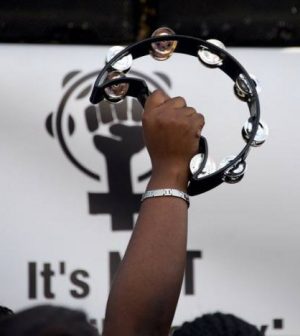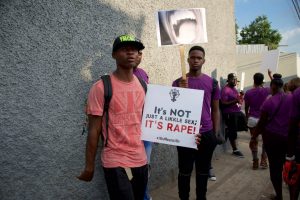- Finding Unshakable Power in a World That Wants to Pull Us ApartPosted 5 months ago
- What could a Donald Trump presidency mean for abortion rights?Posted 5 months ago
- Financial Empowerment: The Game-Changer for Women in Relationships and BeyondPosted 6 months ago
- Mental Health and Wellbeing Tips During and After PregnancyPosted 6 months ago
- Fall Renewal: Step outside your Comfort Zone & Experience Vibrant ChangePosted 6 months ago
- Women Entrepreneurs Need Support SystemsPosted 6 months ago
Fighting for sex assault victims, Jamaican activist accused of crossing legal line

By Rebekah Kebede | Thomson Reuters Foundation
Women’s rights activist arrested after she is accused of naming alleged sexual predators on social media.
KINGSTON, March 22 (Thomson Reuters Foundation) – When Jamaican police made an arrest last week under the nation’s cybercrime laws, the identity of the suspect took many by surprise – a women’s rights activist accused of publicly naming alleged sexual predators on social media.
Latoya Nugent, who co-founded the Tambourine Army, a group fighting for the rights of sexual assault victims, was arrested and charged under legislation covering a range of cyber offences, including cyberbullying.
The case has brought to a head a debate over whether victims should name their alleged abusers in the Caribbean island nation where government leaders admit the justice system fails to punish the guilty.
Critics say naming names could lead to false accusations. But supporters, along with some critics, say survivors have few avenues for justice.
“Our first response, when a little girl or a woman says to us that they have been sexually assaulted or that they’ve been raped, is that we don’t believe them,” said Nugent in a recent radio interview.
“It’s not about recklessly naming perpetrators,” she said. “It is about shifting the shame and blame away from survivors and placing it squarely at the feet of perpetrators.”
Charged with three counts of using a computer for “malicious communication”, Nugent declined to comment to the Thomson Reuters Foundation, citing her court case.
However, the Tambourine Army said in a statement on Monday that Nugent was contemplating a constitutional challenge to how the Cybercrimes Act was used in her case.
Although the Tambourine Army started out just a few months ago, it drew hundreds of people for a march through Kingston this month and has sparked animated debate about how to protect women and girls from violence in the island nation. “Good thing them do … It means a great deal,” said Kerry-Ann Gibson, a 35-year-old mother of four who watched the march.
Gibson said she had been molested by a relative as a child but was accused of lying when she spoke out. The incident caused her such distress that she dropped out of school for a time.
She said she supported the Tambourine Army’s fight so “finally, the young children can be heard.”
Statistics on violence against women in Jamaica are startling. One in eight women has been forced to have sex against her will and half of the country’s rape victims report being attacked before age 10, according to the World Bank.
But only one in 10 adults reports child sexual abuse brought to his or her attention, according to UNICEF.
Jamaica has seen several recent high-profile child sex abuse cases by church leaders and an uptick of deadly violence against women.
Justice is rare.
Only half of the sexual violence cases are cleared, according police statistics provided by the Tambourine Army, which is demanding changes to Jamaica’s Sexual Offenses Act, including a revision of its definition of rape, a sex offenders list and harsher punishment for the sexual abuse of children.
“It’s the type of thing that cuts across class, location, religious affiliation, political affiliation, sexual orientation, level of education,” said Taitu Heron, another co-founder of the Tambourine Army and a gender and development specialist at UN Women.
Even top government officials express concern that there is little recourse for women and girls who are sexually assaulted.
“I have seen cases, rape cases where victims of rape come to the police, report it and then are raped by the police,” Justice Minister Delroy Chuck said in a radio interview, commenting on a recent report that found clergy and police top the list of high profile sex-crime offenders.
‘MALICIOUS COMMUNICATION’
Nugent, using names of alleged abusers supplied by victims, published the information on Facebook, using the moniker “Stella Gibson,” a fictional police detective hunting a serial killer of women on the popular British-Irish crime drama “The Fall.”
A spokeswoman for the Jamaican Constabulary Force said the work of the Tambourine Army against sexual abuse and violence was “quite in order” but distinguished it from Nugent’s case.
“We separate the work and intentions of the Tambourine Army from the actions of an individual,” said Superintendent Stephanie Lyndsay.
Naming alleged abusers is not the answer, she said. “It is not an excuse to break the law.”
Nugent’s arrest also raised questions about the use of the provision of the Cybercrimes Act added two years ago to target such cyberbullying, revenge porn, and online harassment.
Several men who sent online threats to murder and rape a politician were let off with a warning, said Rodje Malcolm, advocacy manager with Jamaicans for Justice.
And the Act appears to create a loophole for charging individuals with criminal libel, a crime abolished four years ago, one analyst said.
“In Jamaica, the offence of criminal libel was abolished by the Defamation Act 2013. But is it now returning in another form?” asked Anthony Gifford, a lawyer and human rights advocate in a column in the Jamaica’s Gleaner newspaper.
(Reporting by Rebekah Kebede, Editing by Ellen Wulfhorst and Katie Nguyen. Please credit the Thomson Reuters Foundation, the charitable arm of Thomson Reuters, that covers humanitarian news, women’s rights, trafficking, property rights, climate change and resilience. Visit http://news.trust.org)







